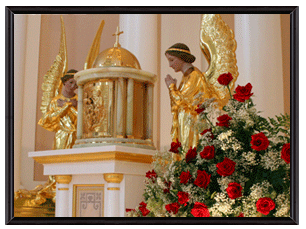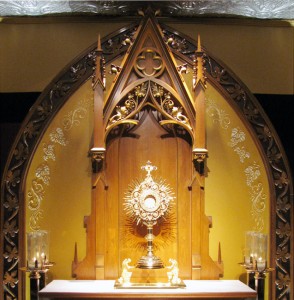And now for an alternative point of view...and I'll do my best to present it without rancor, in the spirit of Christian co-operation.
I am reminded of the straw-man argument that was often presented against Darwinian evolution [full disclosure: I am not an evolutionist in anything approaching the general sense that it is taught in secular school textbooks]. Low-information opponents of evolution would straw-man assert that evolution had to be wrong, because they did not descend from monkeys--but that was not the assertion of Darwinists nor their successors. Rather, the assertion was that present-day monkeys and present-day humans evolved from a proto-simian, some of whose descendants became chimps and some of whose descendants became us.
To assert that the Catholic church as it exists today is the normative model to which all other denominations should be compared is a bit like saying that we evolved from monkeys--that the Catholic church has remained as it always has been, while other denominations have "evolved" from it. The Catholic church as it exists today is the product of numerous reformations and alterations in both doctrine and practice that could very well set it apart from the first generation church, perhaps as much as, or even more than, the Orthodox, the Copts, and of course the various flavors of Protestantism.
When I find myself disagreeing with a doctrine or practice in the Catholic church, it is not because I feel more comfortable with my home church, but because I do not find the doctrine or practice in the early church as it is described in Scripture. I am 60, and I left my home denomination (UMC) almost 30 years ago, in large part because I became convinced that the denomination with which I have since been associated for those last 30 years (LCMS) embodies the doctrines and practices which most emulate those of the early church--with the perhaps-exception of the Orthodox.
Beckwith is correct that there are church fathers whose approach to justification is similar to present-day Catholic teaching, but it is also true that those fathers in most cases were just as temporally removed from the early church as we are from, say, George III--and the reason the NT canon contains the books it does is in large part because the writers were among the first generation of Christians, and when there is a question of doctrine, they are more likely to reflect what Christ taught than those a number of centuries removed would have taught...
...unless the later authors base their teachings on the first-generation writers. But that is simply another way of saying sola scriptura. To the extent that something is affirmed in Scripture, it is orthodoxy; to the extent that it is neither affirmed nor denied in Scripture, it is adiaphora; to the extent that it is denied in Scripture, it is heresy.
That was the approach that Luther wanted to return to the church, not in order to split the church, but in order to unite the church in the truth of Christ. (The 95 Theses were not a Declaration of Independence, but a request for theological consideration.)
And that is how I read the writings of the church fathers. When they align with Scripture, I want to align with Scripture. When they do not align with Scripture, I think three things: first, that these are the teachings of men, which is why they are not in Scripture; second, that no one man can speak the whole truth of the Word of God except the Word of God, meaning both Christ and Scripture; third, that includes me, and I must in humility admit that I need to examine myself on a perpetual basis, not only for sin, but also for heresy, including and especially unintentional heresy.
Could this perpetual examination eventually lead me to the Catholic church? It is possible; it is also possible that it could lead me to the Orthodox church, though it is unlikely to lead me back to another form of Protestantism. Nevertheless, I am comfortable worshipping with anyone who seeks to worship God in Spirit and in truth: some of my most powerful worship experiences have taken place in Pentecostal services in Kingston, and Greek Orthodox liturgies in Ohio, not because I was there, but because Christ was there--and wherever Christ is, that is my home.
Chahin,
And you did present it without rancor. Thank you.
And for both sides, I appreciate your point about Martin Luther: That was the approach that Luther wanted to return to the church, not in order to split the church, but in order to unite the church in the truth of Christ. (The 95 Theses were not a Declaration of Independence, but a request for theological consideration.)” It is something that we Protestants have forgotten about. & of course, the political princes of the 1500s got involved and....
As Fr. Shea said in the college Western civ 102 I took so many years ago, “Luther was right that the Church needed reforming; unfortunately it took over 100 years to accomplish that reform.”
Could this perpetual examination eventually lead me to the Catholic church? It is possible; it is also possible that it could lead me to the Orthodox church, though it is unlikely to lead me back to another form of Protestantism. Nevertheless, I am comfortable worshipping with anyone who seeks to worship God in Spirit and in truth: some of my most powerful worship experiences have taken place in Pentecostal services in Kingston, and Greek Orthodox liturgies in Ohio, not because I was there, but because Christ was there--and wherever Christ is, that is my home. Visit any Catholic Church and you will see a red lamp burning near a Tabernacle.

The sanctuary lamp reminds Catholics that Jesus is present in the tabernacle, and churchgoers often pray before the tabernacle and reflect on the mystery of Christ’s presence in the Eucharist.
I know a priest who did prison ministry. With permission, he brought the Eucharist to the prison, set up a table and chairs in a room, placed the consecrated host into a monstrance and placed it on the table. A group of prisoners were invited to sit quietly in that room for one hour. They were given no information about the monstrance, much less the host. They all expressed an immense sense of peace; some broke down in tears they could not explain. In many parts of the country, there are perpetual adoration chapels where anyone can go, at any time of day, and sit quietly in the presence of the Lord.

No appointment is necessary, no list need be signed, anyone can enter one of these chapels at any time of day to spend time with our Lord. Find a Chapel.

